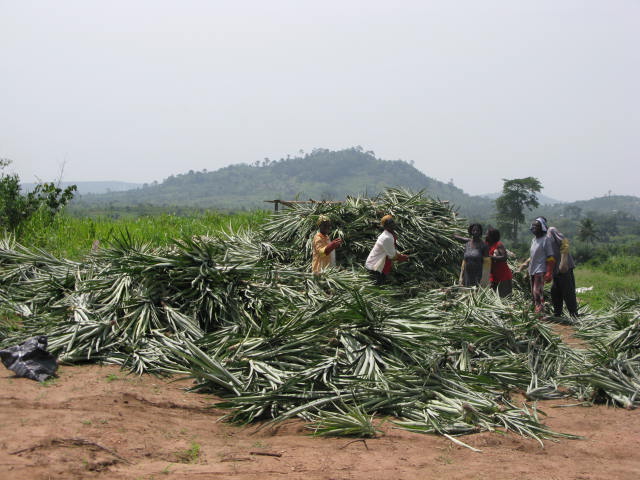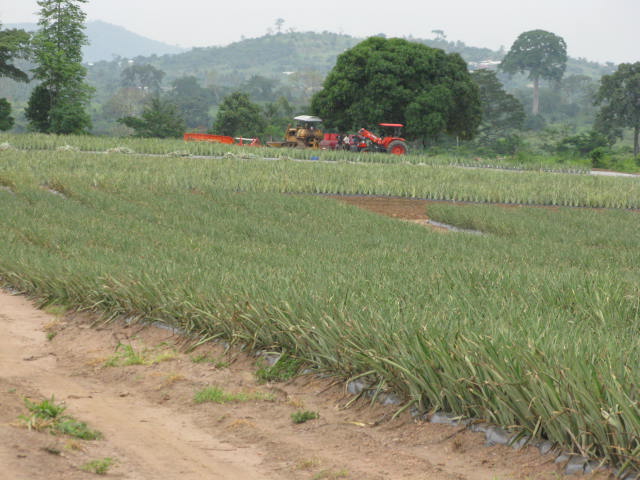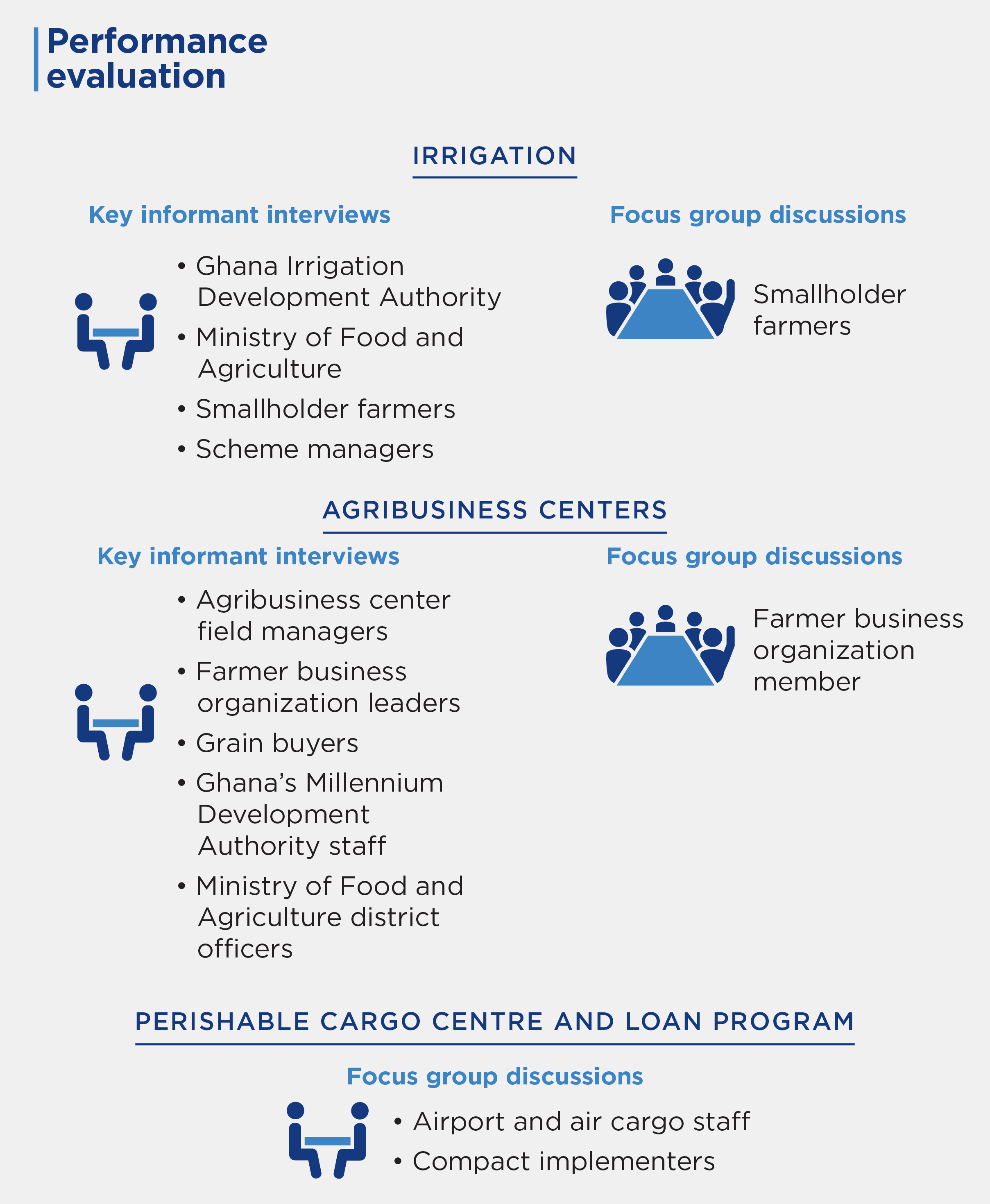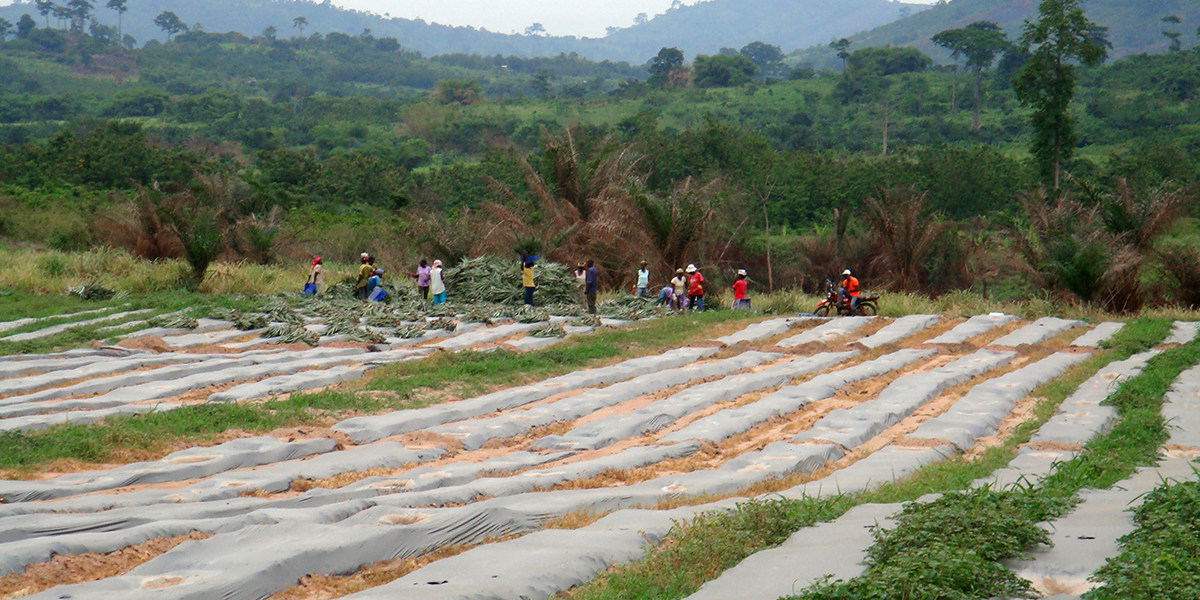Program Overview
MCC’s $536.3 million Ghana Compact (2007-2012) funded the $188.7 million Agriculture Project, which included the Irrigation Activity and Post-Harvest Activity that aimed to increase the production of high-value crops by building and rehabilitating irrigation schemes, constructing post-harvest infrastructure, and improving public sector capacity. The theory was that reduced post-harvest losses and improved crop productivity would increase agricultural profitability and enhance the competitiveness of Ghanaian agricultural products in both domestic and international markets.
Key Findings
Irrigation
- The completed irrigation infrastructure schemes are likely to deteriorate to pre-rehabilitation conditions in five years without changes to scheme management and fee collection. The incomplete irrigation scheme will also likely deteriorate within five years.
- The slow production start of anchor farmers—commercial farmers who worked with smallholder farmers to produce high-value crops—on the completed irrigation schemes delayed the start of smallholder farmer production.
Agribusiness Centers
- Smallholder farmers sold less grain than expected to the agribusiness centers, though the centers remain operational.
Perishable Cargo Centre and Loan Program
- While the airport Perishable Cargo Centre has improved the quality and ease of exporting perishable products, export volumes remain low due to competition from general cargo handlers.
Sustainability of the Investments
- Nearly all the construction was completed during the compact’s final two years, thus there was not enough time to make the necessary institutional arrangements to sustainably manage the infrastructure.
Evaluation Questions
This final performance evaluation was designed to answer the following questions, which cover project implementation and the achievement of anticipated improvements in the Ghanaian agricultural sector:
- 1
Was the project implemented according to plan? - 2
Were the results achieved sustainable? - 3
Are the irrigation schemes, agribusiness centers, Perishable Cargo Centre and loan program achieving their intended outcomes?
Detailed Findings
Irrigation

Farmers harvesting pineapples
While the rehabilitation of the Bontanga and Golinga irrigation infrastructure was completed, it is unlikely that the institutional, social and financial structures needed to maintain this scheme will continue to function.
Conversely, at Torgorme, extensive training programs were conducted, a management structure was put in place, and midsize farmers developed outgrower programs to purchase crops from smallholder farmers. Yet while investments in scheme management were made, the infrastructure was not completed. Consequently, the land was not irrigated and the system was not functional after the compact ended.
Agribusiness Centers
MCC built grain agribusiness centers with processing facilities to help smallholder farmers who belonged to the farmer business organizations—the private sector groups that were granted the facilities. The intended smallholder beneficiaries are not using these facilities because the farmers cannot recover the transportation and processing costs in the sale of their goods. The agribusiness centers that are profitable are providing services to farmers other than the intended beneficiaries.
Perishable Cargo Centre and Loan Program
Despite start-up delays due to additional upgrades required by the private operator, the Perishable Cargo Centre is now operating effectively. The cargo center has improved the quality of fresh horticulture exports that pass through the facility, though its impact has been limited because produce volumes have been lower than anticipated. The limited volumes are in part due to the initial assumption that the center would be the sole provider of perishable cargo handling services at Kotoka International Airport, which did not happen. Instead, the Perishable Cargo Centre started as a new business in a highly competitive environment for air cargo handling and struggles to earn a profit quickly, although this improved later.
The loan program aimed to revitalize the declining exports of Ghanaian pineapples by facilitating the purchase and installation of packing lines, providing pre-cooling and cold storage facilities, and installing standby electric generators at existing pack houses that belong to pineapple exporters. It was expected that with these facilities and the equipment borrowers would be able to export fresh pineapples with adequate shelf life to meet European market requirements. Unfortunately, these expectations were not fully achieved due to the failure of some borrowers to repay their loans and limited year-on-year production volumes.
Sustainability of the Investments

Tractors working in the pineapple fields
Almost all the construction was completed at the end of the compact in the final two years, resulting in activities that did not achieve their original intent. In some instances, there was not enough time after construction to set up sustainable private sector operations of the assets after MCC support ended. In other cases, the project-chosen facility operators did not fully utilize these facilities.
MCC Learning
One key lesson runs through all the Agriculture Project’s activities and sub-activities: Donors are not effective in projects that hinge on creating profitable private sector firms and providing these firms with private sector goods. Each of these projects either failed, or did not fulfill its original intent, because MCC picked winners and tried to play the role of the private sector in the “winning” sector.
No irrigation scheme received both improved infrastructure and support for institutional management. In short, both hard (infrastructure) and soft (e.g. institutional strengthening, farmer training) investments are necessary and complementary for schemes to be operational and sustainable.
Evaluation Methods

A performance evaluation that applied a process methodology evaluated each activity that occurred during the compact period from February 2007–February 2012. The approach, including the timing of field work, was adapted for each activity and sub-activity as appropriate and as follows:
Irrigation
- Field work for the evaluation took place in September 2014 over three weeks.
- Key informant interviews were conducted with the Ghana Irrigation Development Authority, Ministry of Food and Agriculture, smallholder farmers, and scheme managers among others. Two focus group discussion with smallholder farmers were convened at each of the three schemes.
Agribusiness Centers
- The agribusiness centers were completed several months after the compact ended in mid-2012. Field work for the evaluation took place from February–April 2015.
- The evaluation used a qualitative social and financial analysis with key informant interviews with 46 individuals representing all 10 agribusiness centers, including agribusiness center field managers and farmer business organization leaders. The evaluation also included interviews with 11 grain buyers, Ghana’s Millennium Development Authority (the compact implementing entity) staff, and Ministry of Food and Agriculture district officers. Eight focus group discussions were held with 119 farmer business organization members.
Perishable Cargo Centre and Loan Program
- Field work for the evaluation took place in September 2014 by an international agribusiness consultant. In-depth interviews were conducted with relevant airport and air cargo staff as well as individuals who implemented the compact. Financial analysis was conducted on the available information.
2020-002-2346


